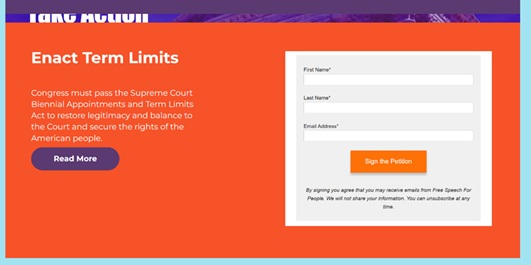Once just the fever dream of President Franklin Delano Roosevelt in the 1930s, adding justices to the Supreme Court—i.e.: “court packing”—was resurrected by left-leaning advocacy nonprofits in 2020. In 2023, more than 40 such groups coalesced within Just Majority, a new intersectional amalgam that tried to fabricate the appearance of broad public support for the Judiciary Act, a proposal that would have allowed President Biden to expand the Supreme Court from 9 to 13 justices.
At the time, Just Majority argued that court packing was merely “court expansion,” a supposedly practical and nonpartisan necessity to bring the Court into the modern era and save our democracy. But Just Majority and the component partners have been conspicuously quiet about the idea since last fall.
What happened?
Alliance for Justice
Alliance for Justice (AFJ) is a strategy-center and thought leader of the nonprofit Left, particularly when it comes to the federal judiciary, and was an early adopter of court packing. Former AFJ president and founder Nan Aron penned a press release in April 2021 endorsing the Judiciary Act.
“Expanding the number of justices and seizing the opportunity to nominate diverse, forward-thinking jurists will democratize the highest court in the land so that it can properly uphold the rights of all Americans,” wrote Aron. She also claimed the Court had been “stolen” on the dubious grounds that a “majority of the justices on the Supreme Court were nominated by presidents who lost the popular vote.”
Leaving aside Aron’s inaccurate understanding of the U.S. Constitution, President Trump won the popular vote in November 2024. So, by Aron’s clumsy reasoning, she should now be thrilled that the three High Court justices selected by Trump during his first term have been retroactively legitimized!
Or not.
AFJ’s website and recent publications show court expansion is no longer a priority. The group’s most recent criticisms of the Supreme Court make no mention of the possibility of expansion, term limits, or ethics reforms. And while a small “Supreme Court Expansion” section of AFJ’s website is still active, the hyperlink that would take users to “learn more about how Court expansion benefits all Americans” is missing.
But some of the old arguments remain.
AFJ also endorsed court packing on the grounds of practicality. “The U.S. has one of the smallest supreme courts on the planet, with not even enough justices to oversee the various circuits,” a still public section of AFJ’s website reads. . “Expanding the Court is an opportunity to not only dilute its current partisanship but also increase its bandwidth to serve the nation.”
The Supreme Court’s workload can only have grown larger since that was written, so surely the nonpartisan experts at AFJ still support expansion to alleviate the Court’s workload and give the popular-vote-winning president a chance to further “democratize” the court? Would they support the newly popular vote approved president if he endeavored to address the highest court’s labor shortage?
The American Constitution Society
Another of Just Majority’s members, the American Constitution Society (ACS), boasts it is “the nation’s foremost progressive legal organization,” with an entire webpage dedicated to “Supreme Court Reform.”
ACS was one of the first nonprofits to promote court expansion by hosting a panel titled “The Possibilities and Perils of Supreme Court Reform” at their 2019 national convention. The online description of the panel uses the inconveniently truthful moniker of “court-packing” rather than the “expansion” euphemism that was concocted later on.
Two months later one of the panelists, Aaron Belkin of director of Take Back the Courts, wrote an article for ACS arguing against court packing’s notable left-leaning detractors—including the late justice, Ruth Bader Ginsburg—and claiming that court expansion was the only way to “save American democracy.”
ACS danced around the idea, writing about the need for “reform” but not openly endorsing court packing until January 19th 2021, notably the day before President Biden was to be sworn in. That’s when ACS’s then-president Russ Feingold sat down with the New York Times to make the case for court packing in an informal debate against a progressive opponent of court packing.
In 2022 Feingold announced that ACS would be “doubling down” on its reform advocacy and explicitly stated that “Reform includes adding seats to rectify the Right’s packing.”
ACS continued to beat the court packing drum all the way through July 2024 when the nonprofit published an article by Taonga Leslie, ACS’s director of policy and program for racial justice. She wrote: “When they have the political power to do so, progressives must immediately expand the Court to reflect the diverse backgrounds, experiences and viewpoints of the nation, and impose term limits on justices (in line with other Western democracies).”
The very next day, President Biden, facing tremendous pressure to withdraw from the 2024 election, announced that he would be endorsing a package of “reforms” to the Supreme Court in the hopes of generating some excitement. ACS applauded the decision and publicly called for court packing once again.
But less than a week later Biden withdrew from the race and ACS’s public support for court packing almost entirely vanished with him. One last podcast from ACS argued for court packing in September 2024, and not a peep has been made on the topic since. Perhaps not coincidentally, a July 2024 YouGov poll showed just 37 percent popular support for court packing.
The ACS Supreme Court Reform webpage hasn’t seen a single update in 2025 and there hasn’t been any staff op-eds about court packing. There hasn’t been so much as a social media post.
The most recent article on the Supreme Court Reform page, a portentous one written in December 2024 by Professor Mark Kende of Drake University Law School, claims that the Court is embroiled in a crisis of legitimacy due to its recent decisions and that “Even before these decisions, commentators, legislators, the president, and even judges discussed the need for Court reform […] and perhaps even expanding the number of Justices.”
The article declines to mention that the ACS was a leader among those unnamed “commentators” calling for expansion.
As with AFJ, the American Constitution Society’s support for court packing wasn’t as consistent with nonpartisan policy goals as it was with very partisan political objectives.
Free Speech for People
Free Speech for People, one of the less well-known members of the Just Majority coalition, had a roller coaster relationship with court packing that is best shown through a photographic timeline.
As a late addition to the court packing movement, Free Speech for People launched a pop-up group called “SCOTUS Reform Now” in April 2024. Below is screenshot from the SCOTUS Reform Now website in April:
The website featured this big red call for court packing for several months, but by July 23rd of 2024 it had changed:
Around the time that Biden withdrew and the polling began to show that court packing was unpopular, the website was changed to reference term limits as well, a provision that both Joe Biden and Kamala Harris endorsed.
Then the election happened. But Free Speech for People didn’t back down until April 2025 (perhaps more due to forgetfulness than principles) when the website was changed one last time:
As time passed the aggressive court packing message at SCOTUS Reform Now was diluted and eventually disappeared entirely, even though Free Speech for People had been aggressively calling for court packing since April 2021.
Free Speech once claimed that 13 justices were necessary, not to swing the partisan balance of the court, but to bring the number of justices into “alignment with the number of circuit courts” and that “Adding more associate justices to track the increase in courts and filings would allow the Supreme Court to accept more cases for review and fulfill its mission of providing equal justice under law.”
As was the case with AFJ, Free Speech for People seems to have coincidentally lost its concern with the Supreme Court’s allegedly growing workload right after the American people put a different president in place to address the supposed problem.
Demand Justice
Finally, there is Demand Justice (DJ) a “dark money” pop-up group sheltered under the umbrella of the Arabella Advisors network that has since spun-off and become its own group.
Since 2018, Demand Justice has been the ringleader of nearly a dozen different partisan campaigns to undermine the Supreme Court. DJ was the most persistent advocate for court packing for the better part of a decade, but lately their zeal has waned.
Unlike the groups mentioned thus far, all of which are 501(c)(3) charities, Demand Justice is a 501(c)(4) “dark money” group that is allowed to play partisan favorites. So, the sudden about-face regarding what was supposed to be good policy is less embarrassing, but no less remarkable.
Demand Justice still has a neglected webpage titled “#ExpandTheCourt” that claims “Adding four seats is the only way to restore balance to the Court immediately. But the page can no longer be navigated to since all links to it have been removed from the homepage.
Demand Justice has used some variation of “expand the court” in a whopping 63 posts on X (formerly Twitter), but has used the phrase just once since May 24, 2024.
The DJ website homepage once featured photos of “expand the court” protests and a headline declaration claiming: “The Supreme Court is Broken. We can restore balance by adding seats.” But by June 6, 2024 this was changed to remove all references to court packing and instead focus on more moderate ethics reforms.
Demand Justice’s sudden redirection in the summer of 2024 is part of a pattern. It’s as if in early June 2024 somebody extremely influential within the Democratic Party universe sent a memo advising these groups to stand down until the election was over.
Perhaps this was because of the aforementioned polling showed court-packing was a losing issue.
One possible suspect for sending such a memo could have been a figure such as Brian Fallon, the founder of Demand Justice who took on a senior role in Kamala Harris’s communications team in 2024. This was just before Biden endorsed term limits and ethics reforms (but not court-packing) and dropped out of the race.
We’ll probably never know what happened for sure, but it’s clear that the court packers all decided to shut up at the same time, and that their timing was convenient for the new job taken by Demand Justice’s founder.
Demos
Demos, another of the Left’s major think tanks, was another early arrival to the court packing coalition, first endorsing the idea with a blog post by Sabeel Rahman in October 2020.
“In a world where the Court possesses such vast power over the fates of so many Americans, it is no longer tenable to restrict its membership to 9 people, the majority of whom will have been appointed by presidents who failed to secure the support of the majority of the electorate,” Rahman wrote.
Rahman also endorsed court packing on the basis that it would provide political stability: “With a larger court, we could further reduce the arbitrary power of any one ‘swing’ justice, by moving to a model akin to Circuit Courts of Appeals, where cases are heard by randomly drawn smaller panels, with an option to appeal to the larger full Circuit.”
In 2021, one of Demos’ experts, Laura Williamson, wrote an eight page “myth busters” document explaining away the problems many moderates had with court packing.
One of the “myths” that was addressed was the idea that “The proposal to expand the Court by 4 seats is just a political power grab, since that’s the number needed to ensure a majority of justices are appointed by Democrats.” Choosing to expand by four seats had nothing to do with power hungry partisanship, Demos claimed:
The last 5 times that Congress has added seats to the Court, it has set the number to match the number of circuits that existed in the federal court system. Today, there are 13 circuit courts, and so it makes sense to follow precedent and set the number of justices at 13.
Demos reiterated support for court packing with a 27 page policy brief a few months later, once again claiming court packing was needed to bring the number of justices into balance with the number of circuit courts.
But, as with the other Just Majority members, Demos’ concerns faded as the 2024 election day neared. The last time the group mentioned court packing was in an August 2024 policy brief where they focused much more on ethics reforms and term limits, dedicating only three short paragraphs on the ninth page to “Court Expansion.”
The Others
The hypocrisy and partisanship of the court packing crowd is clear from the big examples profiled above. But lesser examples prove the entire coalition would like people to forget that they ever supported court packing:
In a burst of potentially accidental sincerity, LCV legal expert Doug Lindner admitted right after Trump won a second term that court expansion should be shelved until “the next Democratic trifecta, if it ever comes.”
- End Citizens United released a “Plan to Reform [the] Supreme Court” that included court packing at the September 2022 Demand Justice ideas conference. It was deleted sometime in early 2025.
- The Women’s March last endorsed Court packing on July 1, 2024 and then stopped talking about it entirely. Their last post in support of court-packing was made in March 2024, even though the group remains very active on social media.
When former allies of Soviet dictator Joseph Stalin fell out of favor, they would get airbrushed out of the official photos. One day, a formerly popular general or political commissar would be in the photo, standing right next to Uncle Joe, but the next day they’d be gone.
In fiction, this behavior was lampooned by the protagonist in George Orwell’s Nineteen-Eighty-Four, whose job it was to toss inconvenient news and facts into a “memory hole” that erased them forever from the historical and media record.
The Just Majority coalition probably isn’t this honest. As soon as the right politicians are in place, expect the Left to pull court packing back out of the memory hole.















